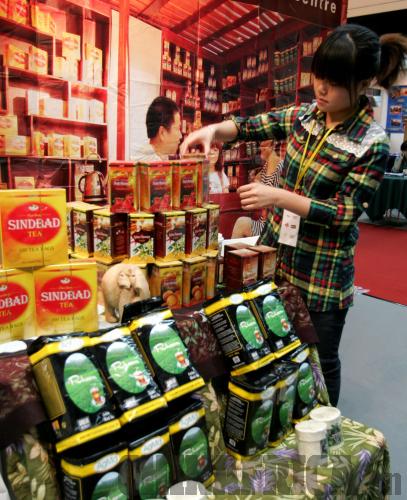|
 |
|
CHANGING TASTES: imported teas are part of the foreign food invasion into China ZHAO BING |
Different flavor
From Thailand's exotic litchis to South Africa's world-renowned wine, imported items such as these were a rarity in China in the 1990s. Nowadays, these goods have become instantly recognizable as they are commonly stocked on the shelves of Chinese supermarkets.
China's market for imported food has been expanding rapidly, with an average annual increase of 15 percent over the past five years. According to statistics provided by the China National Food Industry Association (CNFIA), China's imports of food products amounted to $4 billion in 1992. In 2008, this figure rose dramatically to $49.8 billion.
Retailers are now expecting a sharp increase in business. Industrial experts have forecasted that by 2018, China will become the world's largest consumer of imported food products.
Young domestic demandThe rise in the average income and the expansion of the middle class has set the stage for China's development as a leading market for imported food products.
Data from the National Bureau of Statistics showed the per-capita disposable income for urbanites rose from 343.4 yuan ($52.8) in 1978 to 19,109 yuan ($2,900) in 2010. The per-capita net income for rural people also went up from 133.6 yuan ($20.3) to 5, 919 yuan ($898) during the same period. The compelling figure contrast shows that not only are Chinese better off than three decades ago, but China's potential as a leading imported food consumer in the world is vast.
As for where to find Western food in Shanghai, City Shop is likely to be mentioned. Back in 1995, the company set up its first supermarket in the city. Starting off small, its business area consisted of just 200 square meters.
By 2009, the supermarket had occupied over 3,000 square meters. This is due to the ever-increasing demand for imported products. City Shop is now a franchise, with nine shops in operation in Shanghai, and one in Beijing.
According to Zhang Zongcai, General Manager of the City Shop Beijing branch, the reason why this market is expanding is due to the stronger purchasing ability of China's most lucrative demographic: the young Chinese professionals.
"Apart from expats, half of our customers are Chinese, basically white-collar workers who are pursuing a better quality of life," Zhang told to CBN Weekly.
It has been four years since Zuo Wei completed her studies in the UK. Upon her return to China, she found that her favorite brand of tea was not readily available at her local supermarket.
Therefore Zuo, like many Chinese who return from living in the West, turned to City Shop. It was there where she located her favorite brand, Ahmad Tea. Reminiscing about the taste, she said, "It reinforces my memory about the cheerful tea times that I had with friends in England."
Zuo is not the only person in China who is eager to pursue a Western culinary lifestyle. In the coming decade, China's leading consumption force will be the generations who were born in the 1980s and the 1990s. Industry sources have said that it is they who will embrace the consumption tide of imported foodstuffs.
Supermarkets with imported products are gaining favor among the young Chinese urbanites. An increasing number of supermarkets, convenience stores, hypermarkets and warehouse clubs have begun to stock their shelves with imported products to entice shoppers.
Those retail formats nearly non-existent in China in the 1990s, nevertheless, now account for an estimated 30 percent of the urban food market, with annual growth rates of 30-40 percent.
Market challenges
The market for imported food products has been developing rapidly, but it still remains a small part of the overall food market in China.
Ding Peng, General Manager of Angliss Beijing Food Service Ltd., said that no less than 10 percent of distributors make a profit. The major hurdle that this market faces in terms of profitability is its high prices.
"The average price for a 500-gram packet of imported cookies is 50 yuan ($7.6). It is double or triple the price of domestic brands," said Chen Yuxi, a bank teller who has a penchant for purchasing overseas food items.
Industrial insiders have analyzed that the price of these imported items usually includes a variety of charges, such as tariff, taxes and transport charges. As a result of these charges, the higher prices of these goods have gradually narrowed down this target market in China.
In order to remove some of the red tape from imported products, the Minister of Commerce Chen Deming said earlier this year, the country will promote the imports of key products, streamline non-tariff measures that could potentially impede imports, simplify import procedures and reduce relevant costs.
That could be good news for food dealers, who are gaining in confidence about where their future market lies. The 14th FHC, China's largest global food, wine and hospitality exhibition, held last winter in Shanghai, attracted a record number of 1,017 companies from 79 countries and regions, up from 849 participants in 2009.
Justin Pau, Project Manager FHC Beijing 2009, is optimistic to the prospect of the imported food market in China. "The market has huge potential. Demand and maturity for imported products is growing," he said. "And its own tastes and needs." |